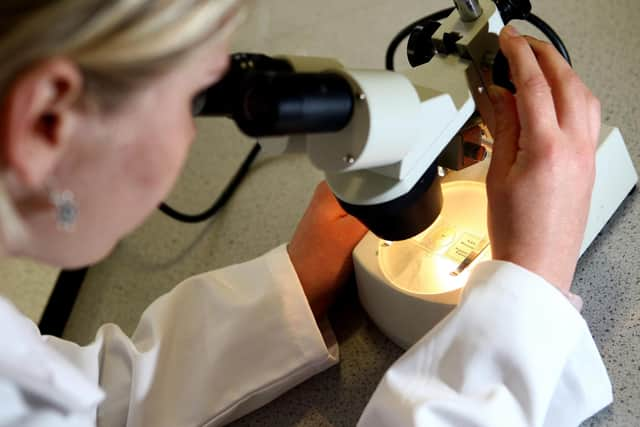Covid Scotland: Staff shortages to blame for 'devastating' cancer diagnosis delays, says Cancer Research UK
New figures published by Public Health Scotland show an increasing proportion of diagnoses are happening at later stages of the disease, meaning fewer opportunities for treatments.
In the period from 2019 to last year, the proportion of bowel, lung and breast cancers diagnosed at stage one was the lowest in eight years, while the proportion of diagnoses at stage four was the highest in six years.
Advertisement
Hide AdAdvertisement
Hide AdScottish Labour called the figures a “ticking timebomb”, while the Scottish Conservatives labelled them “deeply concerning”.


The Covid-19 pandemic has been “devastating” for cancer services, said Cancer Research UK.
The Scottish Government temporarily paused cancer screening programmes, including those for breast and bowel cancer, at the start of the coronavirus pandemic, with these resuming later on in the year.
David Ferguson, Cancer Research UK public affairs manager in Scotland, said the report reinforced fears that opportunities to diagnose cancer at an early stage may have been missed.
Mr Ferguson said while screenings were back up and running after being paused during lockdowns, staff shortages were the root cause of delays to diagnosis and treatment.
“Urgent action is needed,” he said.
"Cancer survival wasn’t good enough before the pandemic. Too many people are waiting far too long for diagnosis and treatment so this must be addressed.
“Staff shortages are at the heart of the problem. A clear road map on exactly how these will be tackled is urgently needed.
"Investment is also needed to train more staff and buy equipment so the NHS can clear backlogs, speed up diagnosis and give cancer patients the best chances of surviving their disease.
Advertisement
Hide AdAdvertisement
Hide Ad“If swift action isn’t taken, our fear is that cancer survival in Scotland could go backwards.”
The statistics show that for breast cancer, there were large falls numbers diagnosed at early stages, with stage one down 35 per cent and stage two down 15 per cent. In contrast, there were small increases in stages three and four.
For bowel cancer, during the nine months of the pandemic last year, there were 1,958 patients diagnosed, 647 fewer than expected. Lung cancer was 3,287, 325 fewer.
It comes as separate figures released by Public Health Scotland showed a 16.5 per cent drop in planned operations from August to September.
Some 1,544 planned operations in September (9 per cent) were cancelled the day before or on the day the procedure was due to take place.
Of those cancelled, 33 per cent were due to capacity or non-clinical reasons.
Labour’s Jackie Baillie warned the NHS was “spinning out of control”, with operations reducing “at the very time we need to be catching up”.
She said: “Early diagnosis is key to survival, but fewer and fewer cases are being caught early.
Advertisement
Hide AdAdvertisement
Hide Ad“We know that many screening programmes are not back up and running at full capacity – this needs to change.”
Ms Baillie continued: “We are facing a perfect storm of cancer cases due to the impact of the pandemic and the SNP’s failure to re-start cancer services swiftly enough.
“We need immediate action to get cancer treatment and screening back on track or else lives will be lost.”
A message from the Editor:
Thank you for reading this article. We're more reliant on your support than ever as the shift in consumer habits brought about by coronavirus impacts our advertisers.
If you haven't already, please consider supporting our trusted, fact-checked journalism by taking out a digital subscription.
Comments
Want to join the conversation? Please or to comment on this article.
